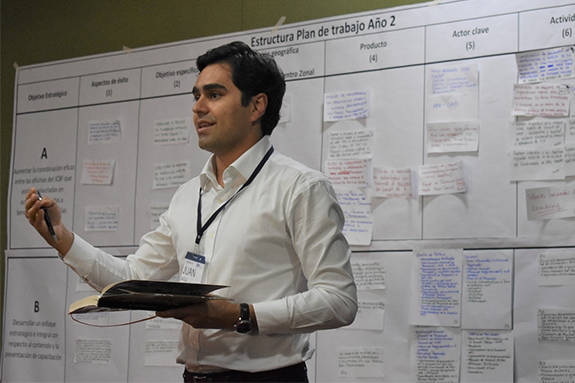
19 Mar Three Questions with Juan Barco: Addressing the Needs of Children in Adversity in Colombia

Juan Barco is the project director for HRH2030 activity in Colombia. An expert in social politics, Juan has worked on developing public policies aimed at reducing extreme poverty, as well as on projects supporting Colombia’s African descendants, indigenous, and campesino communities, as well as victims of armed conflict. Juan holds a dual degree in international relations and political science from the Universidad del Rosario, and a master´s degree in development management and practice from the Universidad de los Andes.
- We would love to learn more about you! What inspired you to work on improving the well-being of children in adversity?
From a young age, I was interested in social services and the public sector. I volunteered for the Colombian Red Cross, which allowed me to get to know the country better and learn more about the situation of its most vulnerable groups. Later, I worked on the Colombian Government’s National Strategy to Overcome Extreme Poverty. In this program, I worked on the design and implementation of better policies to strengthen family dynamics and children’s protection. A few years back, when I was working at the Instituto Colombiano de Bienestar Familiar (ICBF or Colombian Institute for Family Welfare), we designed a highly ambitious proposal for building Centers for Child Development (day care centers) and, today, through these centers, the ICBF provides care for around 1 million children. It is inspiring to see the changes and the social transformation that this work is making for children and Colombian families.
- Now, as part of the HRH2030 Colombia activity, you work closely with the ICBF, which provides care services for vulnerable children, adolescents, and families. What do you see as the most significant challenge facing the social service workforce in Colombia?
After 50 years of armed conflict, one of the most significant challenges that we have as a country is to rethink our idea of Colombia as a nation, by redefining our customs and strengthening our social structures. In that sense, the social service workforce has a leading role to play in the process of rebuilding Colombia as a country at peace. The current state of violence in Colombia, especially against children and adolescents, poses an enormous challenge and calls for the integration of strategies that support these vulnerable groups, the redesign of services that can better accommodate new realities across Colombia’s different regions in the post-conflict era, and the development and implementation of new tools that will strengthen family and community structures.
- Through HRH2030, what do you hope to improve in Colombia’s family well-being and child protection system?
Through HRH2030, we are going to improve policies, services, and support processes for children, adolescents, and families. We are working alongside the ICBF to enhance training processes by putting the emphasis on the participants, their roles, and their competencies. HRH2030 is strengthening the soft and technical skills of the ICBF’s collaborators, using new methods to evaluate how much people learn, and how is that knowledge applied to their work. Equally, we are supporting the improvement of inter-agency coordination networks that we hope will lead to better decision-making on a public policy level. Lastly, we are adapting and applying new analysis models that will give ICBF and HRH2030 access to data to make better decisions.
Photo: Juan Barco presents the work plan for HRH2030 activities with the ICBF for the upcoming year. His goal is to strengthen Colombia’s social workforce to help improve the protective services that work with children, adolescents, and families in the country.





